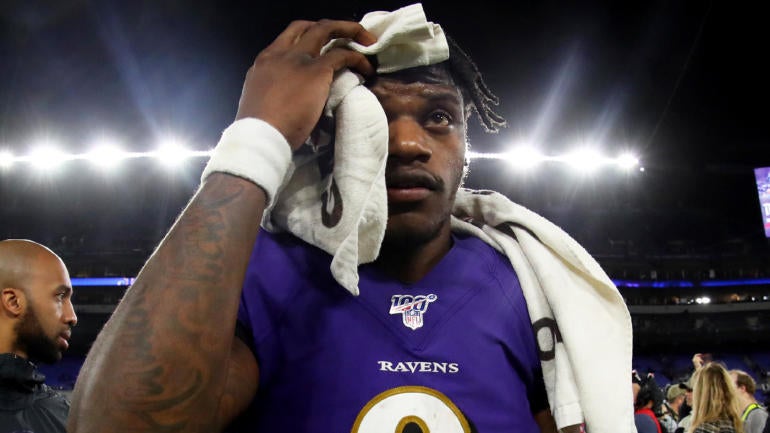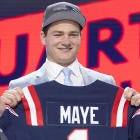
Lamar Jackson announced Monday on Twitter that he had requested a trade from the Ravens in early March. If his time with Baltimore is coming to an end, it would be massively successful in most regards. Jackson is the youngest QB in NFL history (22) to win an MVP. He won it unanimously in 2019. He has two of the four 1,000-yard rushing seasons by quarterbacks all-time.
However, despite all his video game numbers, the Ravens have the same number of playoff wins as the Jaguars, Browns, Texans and Giants since drafting Jackson in 2018. ONE. One playoff win to show for one of the most electric quarterbacks of all-time, playing on a rookie deal.
The blame hardly falls all on Jackson's shoulders. Here's a look at where it does fall.
Ravens didn't invest in wide receiver
Baltimore has built a successful offensive scheme around Lamar to play to his strengths as a rusher, resulting in one of the most dynamic rushing attacks of all-time. However, you could argue they haven't done enough to help him in the passing game. Remember, this is a quarterback who led the NFL with 36 touchdown passes in 2019. He has the highest touchdown pass rate in the NFL (6.4%) since 2019. He has a higher passer rating inside the pocket than Tom Brady in that span.
Yet, the Ravens have invested the fewest cap dollars on offense and second-fewest on wide receivers since 2019. The results? The fewest receiving yards by wide receivers in three of the last four seasons. It wasn't for a complete lack of trying. Baltimore has one of the best tight ends in the NFL in Mark Andrews, and drafted two wide receivers in the first round since 2019, Marquise Brown and Rashod Bateman. It's hard to blame them for Bateman missing 16 games in the last two seasons, but trading Brown to the Cardinals on draft night last year was not a good look, especially after we saw the impact of veteran wide receiver acquisitions on other teams.
The lack of wide receiver investment is apparent with the Ravens' lack of continuity. Since 2018, their most common combination of five skill players was J.K. Dobbins, Marquise Brown, Miles Boykin, Willie Snead and Mark Andrews. They played a whopping 97 snaps together. That ranks 120th among skill player combos in that span.
Decline in playoff performance
Baltimore's limitations in the passing game are especially evident in the playoffs. Jackson has a 1-3 career playoff record with four total touchdowns and seven turnovers. His passer rating in the playoffs (68.3) is 28.4 points lower than his regular season average, the fifth-largest dropoff in NFL history.
The Ravens average 13.0 points per game in Jackson's playoff starts, compared with 28.0 in his regular season starts. That 15.0-point dropoff is the largest by any QB with multiple playoff starts since 2000.
| Lamar Jackson NFL Career | Regular Season | Playoffs |
|---|---|---|
W-L | 45-16 | 1-3 |
Team PPG | 28.0 | 13.0 |
Total TD-turnovers | 125-53 | 4-7 |
Passer rating | 96.7 | 68.3 |
Jackson durability concerns
It's debatable whether you can put those disappointing numbers on the Ravens or Jackson. They both bear some of the blame. There's less gray area with Jackson's durability concerns. He's missed 10 of the last 22 games, including playoffs, after missing zero games due to injury in his NFL career prior to that. Surely the Ravens would have had a chance to add to their playoff win total had Jackson not suffered season-ending injuries in each of the last two seasons.
Regular season success with no playoff success
The results, in a word: Underachievement. The Ravens won 53 games in the last five seasons. The only team all-time with more regular-season wins in a five-season span with only one or fewer playoff wins was the Falcons in their first five seasons with Matt Ryan from 2008-12.
Interestingly enough, Atlanta only won two playoff games in six seasons with Michael Vick, so it's not like Baltimore's run with Lamar is completely unprecedented.
That doesn't make it any less disappointing though, especially in light of Jackson's trade demands.






















